Politics
Intelligence academy urges AI-backed roadmap for Türkiye
Türkiye could tailor its strategic orientations based on a report from the National Intelligence Academy (MIA) that defines risks and aims to guide ethical, sustainable and inclusive artificial intelligence future vision.
The report, titled “Türkiye’s Roadmap on Artificial Intelligence, Society and Security,” evaluates the impact of AI technologies on society, security and cultural values, as well as the epistemological and ethical consequences of technological transformation.
MIA outlines a framework of seven thematic headings, ranging from current technologies to cultural threats, security to digital economy and workforce.
It defines short, medium- and long-term roadmaps that determine Türkiye’s strategic direction while presenting data-based recommendations to decision-makers and the Turkish public.
The impact of AI on the human mind and social order is comparable to the Enlightenment Revolution, according to the report.
The report argues that the tendency to attribute consciousness to AI robots has weakened the distinction between the real and synthetic and the increasingly fragile access to the truth.
It warns against “excessive trust” in AI, which can lead to epistemic laziness and loss of responsibility in information production.” The report emphasizes the importance of preserving human responsibility in information accessibility and production processes in order to prevent this threat from growing.
With this caution in mind, it proposes AI-assisted roadmaps over the economic, energy and environmental development potential of AI technologies.
The report defines the “green artificial intelligence” approach as a standard that increases energy efficiency on a global scale, while emphasizing that Türkiye should invest in “green chip design” and “sustainable hardware-software” compliance in line with these trends.
MİA highlights the strategic importance of environmentally sensitive artificial intelligence policies in the report, which points out that the expert pool in the field of AI in Türkiye increased by 46%; that domestic initiatives also attracted major investments, and that public support provided by TÜBITAK strengthened strategy-focused public investments.
The report, which draws attention to high energy consumption, highlights structural difficulties such as technical resource limitations and international compliance costs, and indicates that the technical infrastructure should be strengthened and skill transformation should be accelerated. It notes that these developments are critical steps in Türkiye’s transition from a regional follower to a leading actor.
AI roadmap
The proposed roadmap is planned under short, medium and long-term application headings.
In the short term, it is envisaged to establish ethical centers and initiate green artificial intelligence projects, in the medium term, data networks and local language models, and in the long term, Türkiye taking on a role in global governance.
It emphasizes that the roadmap overlaps highly with the National Artificial Intelligence Strategy and current action plans. It claims its holistic plan is supported by leading institutions, budget estimates and performance indicators.
The determination of the institution will translate strategic priorities into the field, according to MIA.
The report states that the ultimate goal is to move Türkiye to an innovative, secure and inclusive artificial intelligence leader position in the post-2030 period, and that the MIA recommends developing energy-sensitive and human-centered solutions that are based on ethical principles to achieve this goal.
AI is a central source of acceleration in Türkiye’s socioeconomic development package, the report says, arguing that this acceleration will turn into social benefit not only with the purchase of technology, but also with solutions that are based on ethical principles, energy-sensitive and have passed security tests.
Strengthening ethical frameworks
According to the report, in the field of security, autonomous weapon systems based on artificial intelligence, cyberattacks and election manipulation came to the forefront as prominent threats.
MIA recommends red team laboratories, secure architectural designs and election integrity platforms against these risks, while also emphasizing the importance of developing international norms, strengthening ethical frameworks and technology-focused diplomatic initiatives.
In the field of cybersecurity, the report includes content watermarking, bot detection and disinformation combat applications among its solution suggestions, and reminds that the MIA produces interdisciplinary solutions ranging from security to diplomacy.
The report, which offers comprehensive solutions against threats such as cultural homogenization, privacy violation and disinformation, underscored issues such as the establishment of the National Artificial Intelligence Ethics Center, the implementation of digital heritage portals and the development of culturally sensitive bias tests.
The report emphasizes that the relationship that society establishes with technology should be evaluated not only in terms of user experience, but also in the context of ethics and values.
It proposes a communication and education strategy that includes stakeholders to increase this awareness.
Politics
Battle lines emerge as Türkiye’s CHP faces trial over vote buying
On Monday, the Turkish main opposition Republican People’s Party (CHP) will have its administration’s legitimacy challenged by a court in Ankara. As the fate of current chair Özgür Özel hangs in the balance, his predecessor Kemal Kılıçdaroğlu enjoys the spotlight, even though he barely appears in public as he is used to. Over the past week, his name was trending on social media along with a barrage of media reports revealing cracks within the party.
Based on his remarks and criticism he faced from Özel’s supporters, Kılıçdaroğlu will apparently seek to take back the chairmanship of Türkiye’s oldest party if the court rules Özel and his alleged accomplices bought votes of delegates during a November 2023 intraparty election that brought Özel to power.
The CHP long boasted intraparty “democracy” and maintained a face of unity despite deep divisions within in the past, but the court battle may be the final straw.
Based on Monday’s verdict, the party can be appointed a trustee by the court, and Özel may lose his post if the court rules his chairpersonship should be nullified. Kılıçdaroğlu was quoted by pro-CHP journalists saying that he would not consent to the appointment of a trustee and may take over the CHP. If the court rules for “absolute nullification” of the 2023 election of Özel, Kılıçdaroğlu can be reinstated anyway to the post he lost under the existing laws. After his remarks emerged, he came under fire and was accused of stirring up tensions within the party by CHP supporters on social media. However, several CHP lawmakers came to his aid on Thursday, sharing social media posts one after another in support of the veteran politician. Lawmakers claimed Kılıçdaroğlu faced “systemic, heinous attacks.”
The Sabah newspaper reported on Friday that Kılıçdaroğlu even prepared a list of names he would expel from the party if he returns to his former post. The newspaper reported that Kılıçdaroğlu was planning to target particularly those whose names came up in corruption investigations. Former Istanbul Mayor Ekrem Imamoğlu is the most prominent name in the CHP allegedly involved in corruption. Nominated as a future presidential candidate of the party by Özel, Imamoğlu is also among the suspects in the trial where several prominent names of the party are accused of manipulating delegates to vote for Özel in the 2023 vote. Imamoğlu has openly sided with Özel prior to the intraparty election.
Imamoğlu, who is currently held in Silivri prison, where he was visited by Kılıçdaroğlu in the past weeks, hit back at his former political mentor over his remarks regarding waiting for the court’s verdict about the 2023 election. “I was disappointed,” he told pro-CHP journalist Ismail Saymaz as quoted on Friday. Imamoğlu also said he was “betrayed” by Kılıçdaroğlu when the latter said he did not approve of mass street protests and ensuing riots launched by CHP supporters after the mayor’s arrest. His remarks indicate how big the fallout between Imamoğlu and Kılıçdaroğlu, who propelled the former’s rise to fame from mayor of a small district in Istanbul to presidential candidate of the CHP. Tanju Özcan, the media-savvy mayor of Bolu province for the CHP, may also face expulsion from the party if Kılıçdaroğlu returns. Özcan is a fierce opponent of Kılıçdaroğlu and recently called for the latter’s expulsion from CHP.
Özel has been careful about his remarks about Kılıçdaroğlu so as not to harm the public image the CHP meticulously crafted as an indivisible political entity, but the party’s mouthpieces in the media consistently portray him as a traitor to the party’s cause. Some even go as far as accusing him of being a puppet for the government, conveniently ignoring that it was Özel who reached out to the government for “normalizing” ties with the ruling party last year, after years of bitterness under Kılıçdaroğlu.
Politics
Greece, Greek Cyprus push unlawful, maximalist demands: Türkiye
Türkiye on Friday said the conclusions adopted at the European Union leaders’ summit demonstrate that Greece and the Greek Cypriot Administration of Southern Cyprus (GCASC) continue efforts to impose their “maximalist claims,” which Ankara argues violate international law and the principle of equity.
“The results adopted at the European Union (EU) Leaders’ Summit held on June 26, 2025, demonstrate that Greece and the Greek Cypriot Administration of Southern Cyprus (GCASC) continue their efforts to impose their maximalist claims, which are contrary to international law and the principle of equity, on the EU,” Foreign Ministry spokesman Öncü Keçeli wrote on X.
Keçeli reiterated Türkiye’s position that the 2019 Memorandum of Understanding signed with Libya on the delimitation of maritime jurisdictions in the Eastern Mediterranean is “entirely legitimate under international law.” He said the agreement clearly shows that Ankara will not allow violations of its lawful rights and interests in the region.
He criticized the EU for issuing “politically motivated and biased” statements on a sensitive matter such as maritime delimitation, which he emphasized involves legal and technical complexities.
“Instead of endorsing legally invalid claims, the EU should call on all its members to comply with international law,” Keçeli said.
He added that Türkiye will continue to firmly defend its legitimate rights and interests in the Eastern Mediterranean within the framework of international law.
Politics
‘Türkiye set to be geostrategic hub of stability’
Ministers and senior officials from 70 countries, as well as industry leaders and representatives of international organizations, came together in Istanbul for a two-day Global Transport Connectivity Forum organized by the Turkish Ministry of Transport and Infrastructure.
In a keynote speech at the event, President Recep Tayyip Erdoğan highlighted the increased connectivity of Türkiye and how it made the country a geostrategic hub of stability.
Erdoğan stated that he believed the forum would be an important platform showcasing Türkiye’s vision in transportation and leadership. “The importance of logistics lines increases day by day. Tensions in our region, uncertainties on air routes, the state of the Strait of Hormuz demonstrated how valuable secure transportation routes are,” he said.
Türkiye straddles Asia and Europe, on major international routes being reshaped by emerging new global powers, particularly China. Türkiye’s improved international relations and the rising profile as a major diplomatic actor and partner against international challenges contribute to its geographical position. Yet, the country is also located next door to conflicts and issues plaguing the Middle East, from tensions between Iran and Israel to the latter’s ambitious and brutal expansionism that spread from the Palestinian territories to Lebanon and Syria.
The president stated that Türkiye’s approach to communications and energy lines over the past 22 years was based on the rising importance of logistics routes. “The road is civilization. This is why we invested heavily in roads. We invested about $300 billion in transportation and communications infrastructure. We connected 77 provinces with divided roads,” he said, referring to flourishing wide highways that replaced narrow and poorly maintained roads connecting the country’s 81 provinces.
“Global commerce is being reshaped. Transportation investments became almost a driving force of our economy. Our investments did not cease, and we continue investing in communications and energy lines,” Erdoğan said.
“We introduced high-speed train lines; we made airlines accessible to a wider public and increased the number of airports to 58. Istanbul Airport alone broke its own record with about 32 million passengers in the first five months of 2025,” he noted.
Türkiye will transform its geopolitical opportunities into a comprehensive economic advantage with the Development Road project that will benefit the entire region, Erdoğan also stated.
Cargo arriving at Iraq’s Faw Port is expected to reach Europe via Türkiye, thanks to the Development Road project, he said.
“With a 10-year projection, the Development Road is expected to generate over $50 billion in production impact and create an average of 63,000 jobs annually,” he further said.
The Development Road is designed to facilitate the transport of goods from the Gulf to Europe via the Grand Faw Port in Basra in southern Iraq. The port would be linked to Türkiye and subsequently to Europe through an extensive network of railways and highways. Türkiye, Iraq, Qatar and the United Arab Emirates (UAE) are sides in the Development Road. The initiative, which was unveiled in 2023, would turn Iraq into a transit hub by shortening travel time between Asia and Europe to rival the Suez Canal.
On the Middle Corridor, Erdoğan said that the potential of the Middle Corridor’s trade volume via railway is around $75 billion.
“We anticipate that implementing projects for the Middle Corridor will generate a production impact of $114 billion and create an average of 144,000 jobs annually,” he added.
The Trans-Caspian East-West-Middle Corridor Initiative, widely known as the Middle Corridor, begins in Türkiye and passes through the Caucasus region via Georgia and Azerbaijan, crossing the Caspian Sea and traversing Central Asia to reach China. It is one of the most important components of the efforts to revive the ancient Silk Road.
Politics
Wartime solidarity proves Iran, Türkiye’s close ties: Envoy
Iran is thankful to Türkiye for standing by it during the “unequal and cruel war” with Israel, according to the Iranian ambassador to Ankara.
“Turkish people are in solidarity and unity with Iranians. This goes to show how close the two nations are,” Mohammad Hassan Habibullahzadeh said Friday as he met with journalists at the Turkish Press Federation in Ankara.
Iran’s neighbor, Türkiye, was quick to condemn Israel’s attacks and unprecedented U.S. strikes on Iranian soil, warning against the risk of escalating the conflict and destabilizing the entire Middle East.
On Iran and Türkiye’s relations in the fight against terrorism, Habibullahzadeh said there was an understanding in his country that “Türkiye’s security is Iran’s security.”
Terrorist organizations in the region are sometimes used by foreign countries to create insecurity and instability, Habibullahzadeh said, expressing the need for extensive cooperation against the threat.
On Iran’s 12-day war with Israel, Habibullahzadeh said Iran does not accept the term “cease-fire” because it was established with “the other side’s request.”
The war erupted on June 13 when Israel launched strikes that it said were aimed at halting Iran from developing a nuclear weapon – a charge Tehran denies.
Israeli strikes killed at least 30 top commanders of Iran’s Revolutionary Guards, according to local media, including its commander-in-chief, Hossein Salam, and the head of its aerospace forces, Amirali Hajizadeh, who oversaw the country’s ballistic missile program.
Israeli attacks, which killed at least 627 civilians and wounded nearly 4,900 people, were against international rules and laws, Habibullahzadeh said.
“The Zionist regime (Israel) finally asked the U.S. to intervene in the last days of the war due to their miscalculations,” Habibullahzadeh argued.
Iran fired more than 550 ballistic missiles at Israel, most of which were intercepted, but those that got through caused damage in many areas and killed 28 people.
The U.S. stepped in on Sunday to hit Iran’s three most important strikes with a wave of cruise missiles and bunker-buster bombs dropped by B-2 bombers, designed to penetrate deep into the ground to damage the heavily fortified targets. Iran, in retaliation, fired missiles at a U.S. base in Qatar on Monday but caused no known casualties.
Habibullahzadeh, who said that the attacks have stopped for now, said that his country will respond if there are any more attacks.
Politics
EU leaders starting to align with Erdoğan on Gaza, Ukraine: Fidan
Foreign Minister Hakan Fidan said President Erdoğan has maintained the same stance from the beginning on both the Gaza and the Ukraine wars, and that European leaders are now starting to align with him.
Speaking on a live broadcast on aHaber, Fidan said European leaders were forced to change their stance.
“Many European countries did not want a cease-fire that favored Israel, but now they, too, see that the situation has reached an unbearable level,” Fidan said.
Regarding the Israel-Iran conflict, Fidan said Israel’s attack on Iran pushed Iran to invoke its right to legitimate self-defense, as he strongly criticized the Israeli prime minister for exploiting chaos for his interests.
“Netanyahu does not hesitate to set the region on fire for his own political survival,” Fidan said.
He continued by saying that the recent conflict has shown that Israel does not have the capability to eliminate Iran’s nuclear program alone.
The top Turkish diplomat said President Erdoğan conveyed a message to both sides, expressing Türkiye’s readiness to play any necessary role.
He also noted that there are signs that the process activated in Oman may resume, with a possible meeting point between the U.S. and Iran.
“Türkiye has offered ideas to bridge the gap, as the core issue remains: the U.S. wants zero enrichment in Iran, while Iran insists on its right to peaceful nuclear energy,” he said.
Politics
Turkish mosques in Germany under threat of increasing attacks
Germany recorded 175 attacks targeting mosques across the country in 2024, a figure that continues to climb annually, Muharrem Kuzey, head of Turkish-Islamic Union for Religious Affairs (DITIB), said Friday.
Speaking to Anadolu Agency (AA), Kuzey said threats against places of worship cover a wide range of harassment, from offensive graffiti to threatening letters.
According to figures by the Anti-Discrimination Bureau of the DITIB, mosques suffered from 175 attacks in 2024, a fourfold increase compared to 2021. Ninety-six percent of those mosques are run by the DITIB. The report by the agency shows that about 60% of cases involve letters or emails containing threats, and these are followed by attacks damaging property and drawings of illegal symbols such as swastikas.
The DITIB runs about 1,000 mosques across Germany. The country is home to more than 3 million Turks. It is the largest community of its kind in the European country, which recruited Turkish citizens en masse during post-World War II economic recovery efforts. The union is among the largest umbrella organizations for Muslims in Germany. Since 2014, the DITIB’s bureau has compiled figures regarding attacks targeting mosques.
Kuzey says attacks have particularly climbed since the new round of the Palestine-Israel conflict began on Oct. 7, 2023.
Since Oct. 7, 2023, Europe’s political and social landscape has witnessed what experts call a seismic and deeply unsettling transformation, significantly impacting its Muslim communities.
In countries such as the U.K., Denmark and France, the aftermath of Hamas’ attack and Israel’s ongoing genocidal war on Gaza has unleashed a sustained and entrenched wave of Islamophobia, far beyond the familiar episodic spikes. “It’s a complete shift in the everyday life of Muslim communities in Britain, but also across the world,” says Aristotle Kallis, a professor of modern and contemporary history at the U.K.’s Keele University. “What happened after Oct. 7 is a complete shift of the political narrative.”
Germany’s Interior Ministry announced in May that hate crimes rose 28% in 2024 compared to the previous year, reaching 21,733. According to the report, a significant portion of this increase was xenophobic crimes, which rose 29% to 19,481. In the hate crimes category, crimes targeting Muslims also jumped. Islamophobic hate crimes climbed 26% from 2023 to 1,848.
Kuzey stated that mosques had suffered from 43 attacks by October 2023, and in the last three months of 2023, they recorded 100 attacks. He pointed out that turmoil and conflicts in the Middle East also affected communities in Germany, noting an “alarming level” of attacks.
“We share these figures with politicians as well as community leaders and discuss what measures can be taken to tackle this. We are discussing an encouraging culture of coexistence and ways to strengthen it,” he said.
He noted that Islamophobia and anti-Semitism were actually “other names for xenophobia,” and they sought joint action against both by offering cooperation to a major Jewish body in Germany.
“Muslims are now part of German society. Our people, including our youth, are businesspeople, academics and politicians now. They demonstrate that we are an inseparable part of society. These mosque attacks cannot deter us, but we are thinking hard on how to prevent them through promoting multi-culturalism,” he said.
“It is not merely the task of Muslims or foreigners living here to promote these efforts. Broader German society should be willing. We have hope for the future and will continue supporting coexistence with our projects,” he said.
Kuzey said they also installed security cameras at mosques and followed up on legal proceedings against attackers. “We are in close contact with authorities so that those people are brought to justice,” he added.
-

 Daily Agenda2 days ago
Daily Agenda2 days agoFETÖ operation in 46 provinces: 361 suspects were caught
-

 Daily Agenda2 days ago
Daily Agenda2 days ago32 arrests in parsley doner operation connected to FETÖ
-
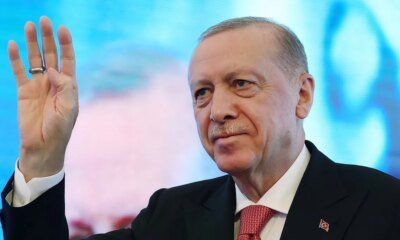
 Daily Agenda3 days ago
Daily Agenda3 days agoThey cannot prevent urban transformation – Breaking News
-
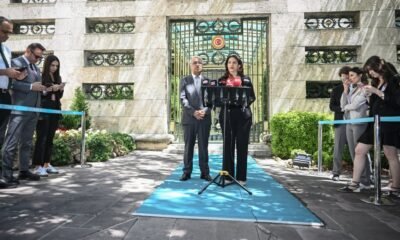
 Politics2 days ago
Politics2 days agoParliament under spotlight in new phase of ‘terror-free Türkiye’
-
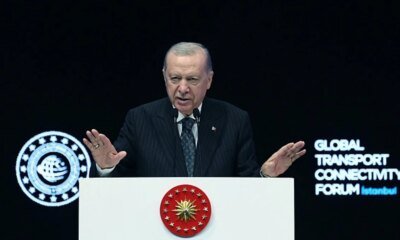
 Daily Agenda2 days ago
Daily Agenda2 days agoPresident Erdoğan: The importance of new transport corridors is obvious
-

 Sports2 days ago
Sports2 days agoProtester charged after disrupting Super Bowl with ‘Free Gaza’ flag
-
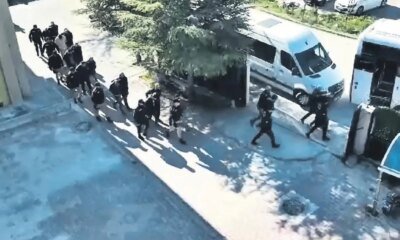
 Daily Agenda2 days ago
Daily Agenda2 days agoCrypos were deciphering – Breaking News
-
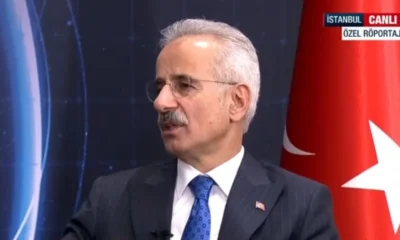
 Daily Agenda3 days ago
Daily Agenda3 days agoMinister of Transportation Abdulkadir Uraloğlu in AHABER: We are a role model for cyber security




